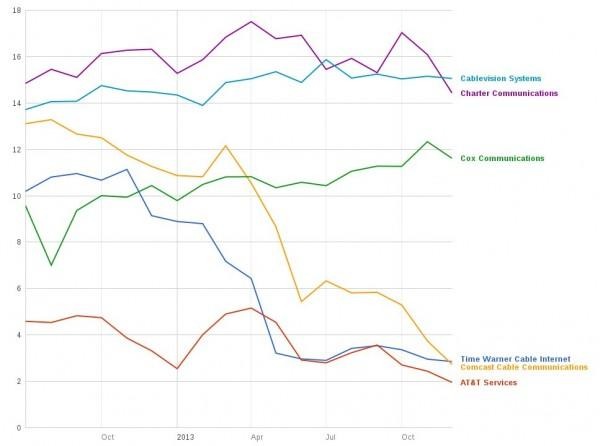New Internet throughput data could reveal the ugly side of peering
Getting content delivered to your PC, TV or mobile device via the Internet is no simple matter, but the business ecosystem working behind that can be even more convoluted. While not exactly pointing to the fact, new data gathered about Internet performance might be pointing the finger at the almost unspoken but widely practiced business of peering.
Peering refers to how one network, which happen to be owned or affiliated with an Internet service provider, connects with other networks, or peers, who happen to be owned by other ISP or as standalone content providers like Netflix. While this arrangement might sound natural in a very interconnected world, in practice, there have been some back and forth negotiations that occur, which unfortunately usually ends up with users' access to content being throttled, depending on the source.
This is the situation that seems to be implied in the data trend coming from Measurement-Lab or M-Labs, a consortium that provides part of the FCC's data for the agency's Measuring Broadband Quality report. Although the FCC is yet to release a final report, which will also include data from other sources and Internet watchdogs, the data from M-Labs could already very well be damning.

M-Labs' charts show a drastic decrease in download throughput on Comcast, Time Warner Cable, and AT&T. One theory for this trend is being put on peering. It might almost be understandable that ISPs do not want independent or even competing content providers to be "freeloading" on their network lines and expect an amount of payment from them, which is what peering arrangements boil down to. However, it is equally questionable whether ISPs actually have the right to throttle the download from these sources, considering consumers have paid for use of those lines, no matter the source of content. Unfortunately, peering is almost a rather grey area, not even covered by recent debates of net neutrality, leaving users, as always, the victims of clashing Internet titans.
There is some caveat to this data from M-Labs that bears noting. As mentioned, this will not be the complete picture that the FCC will be presenting when it publishes its report, probably in late Spring. M-Labs' data also doesn't include data that are more difficult to map, particularly from the lines of Verizon. Lastly, this Internet Broadband performance trend doesn't seem to appear even on popular broadband tests like Ookla's Speedtest.net. M-Labs' explanation is that unlike Ookla, which searches for the closest server that can be tuned to get higher scores, their tests try to replicate the whole data packet hopping route, making sure that they are experiencing the speeds, and sometimes pain, that end users also get.
VIA: GigaOM
